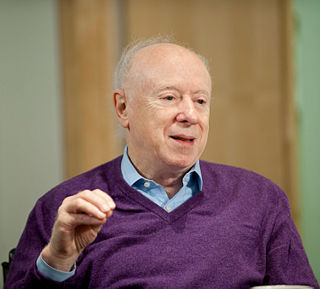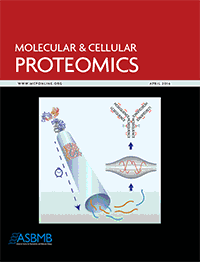
Joseph Leonard Goldstein ForMemRS is an American biochemist. He received the Nobel Prize in Physiology or Medicine in 1985, along with fellow University of Texas Southwestern researcher, Michael Brown, for their studies regarding cholesterol. They discovered that human cells have low-density lipoprotein (LDL) receptors that remove cholesterol from the blood and that when LDL receptors are not present in sufficient numbers, individuals develop hypercholesterolemia and become at risk for cholesterol related diseases, notably coronary heart disease. Their studies led to the development of statin drugs.

The Journal of Biological Chemistry (JBC) is a weekly peer-reviewed scientific journal that was established in 1905. Since 1925, it is published by the American Society for Biochemistry and Molecular Biology. It covers research in areas of biochemistry and molecular biology. The editor is Alex Toker. As of January 2021, the journal is fully open access. In press articles are available free on its website immediately after acceptance.

Roger David Kornberg is an American biochemist and professor of structural biology at Stanford University School of Medicine. Kornberg was awarded the Nobel Prize in Chemistry in 2006 for his studies of the process by which genetic information from DNA is copied to RNA, "the molecular basis of eukaryotic transcription."

Mildred Cohn was an American biochemist who furthered understanding of biochemical processes through her study of chemical reactions within animal cells. She was a pioneer in the use of nuclear magnetic resonance for studying enzyme reactions, particularly reactions of adenosine triphosphate (ATP).

Jeremy Mark Berg was founding director of the University of Pittsburgh's Institute for Personalized Medicine. He holds positions as Associate Senior Vice Chancellor for Science Strategy and Planning and Professor of Computational and Systems Biology at the University of Pittsburgh. From 2016 to 2019, Berg was editor in chief of the Science journals.

Molecular & Cellular Proteomics is a monthly peer-reviewed scientific journal established in 2002 and published by the American Society for Biochemistry and Molecular Biology. It covers research on structural and functional properties of proteins, especially with regard to development.
The Human Proteome Project (HPP) is a collaborative effort coordinated by the Human Proteome Organization. Its stated goal is to experimentally observe all of the proteins produced by the sequences translated from the human genome.
Tobias C. Walther is the chair of the cell biology program at Sloan Kettering Institute in New York City and a professor at Weill Cornell School of Medicine, where he co-directs the Farese and Walther lab. He has been a Howard Hughes Medical Institute investigator since 2015. His primary responsibilities are to provide leadership in research and teaching in the scientific fields of metabolism, membrane biology and lipids.

Judith P. Klinman is an American chemist, biochemist, and molecular biologist known for her work on enzyme catalysis. She became the first female professor in the physical sciences at the University of California, Berkeley in 1978, where she is now Professor of the Graduate School and Chancellor's Professor. In 2012, she was awarded the National Medal of Science by President Barack Obama. She is a member of the National Academy of Sciences, American Academy of Arts and Sciences, American Association for the Advancement of Science, and the American Philosophical Society.
Susan Taylor is an American biochemist who is a Professor of Chemistry and Biochemistry and a Professor of Pharmacology at the University of California, San Diego. She is known for her research on protein kinases, particularly protein kinase A (PKA). She was elected to the Institute of Medicine and the United States National Academy of Sciences in 1996.
Catherine (Cathy) Drennan is an American biochemist and crystallographer. She is the John and Dorothy Wilson Professor of Biochemistry professor at the Massachusetts Institute of Technology and a professor at the Howard Hughes Medical Institute.
Lila Mary Gierasch is an American biochemist and biophysicist. At present, she is a distinguished Professor working on "protein folding in the cell" in the Department of Biochemistry and Molecular Biology at the College of Natural Sciences, University of Massachusetts Amherst.
Marion Sewer (1972-2016) was a pharmacologist and professor at the University of California, San Diego's Skaggs School of Pharmacy and Pharmaceutical Sciences known for her research on steroid hormone biogenesis and her commitment to increasing diversity in science. Much of her research centered around cytochrome P450, a family of enzymes involved in the conversion of cholesterol into steroid hormones. She died unexpectedly at the age of 43 from a pulmonary embolism on January 28, 2016, while traveling through the Detroit airport.
Ruma Banerjee is a professor of enzymology and biological chemistry at the University of Michigan Medical School. She is an experimentalist whose research has focused on unusual cofactors in enzymology.

Luciano Marraffini is an Argentinian-American microbiologist. He is currently professor and head of the laboratory of bacteriology at The Rockefeller University. He is recognized for his work on CRISPR-Cas systems, being one of the first scientists to elucidate how these systems work at the molecular level.
Olga Vitek is a biostatistician and computer scientist specializing in bioinformatics, proteomics, mass spectrometry, causal inference of biological function, and the development of open-source software for statistical analysis in these areas. She is a professor in the College of Science and Khoury College of Computer Sciences of Northeastern University.
Catherine E. Costello is the William Fairfield Warren distinguished professor in the department of biochemistry, Cell Biology and Genomics, and the director of the Center for Biomedical Mass Spectrometry at the Boston University School of Medicine.
Nicki Packer FRSC is an Australian college professor and researcher. She currently serves as a distinguished professor of glycoproteomics in the School of Natural Sciences at Macquarie University and principal research leader at Griffith University's Institute for Glycomics. Packer is a Fellow of the Royal Society of Chemistry and in 2021 received the Distinguished Achievement in Proteomic Sciences Award from the Human Proteome Organization. Her research focuses on biological functional of glycoconjugates by linking glycomics with proteomics and bioinformatics.
Peipei Ping is an academic specializing in cardiac physiology, system biology and data science.








